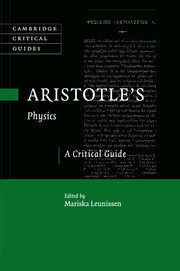Description
Aristotle's Physics
A Critical Guide
Cambridge Critical Guides Series
Coordinator: Leunissen Mariska
This volume provides cutting-edge research on Aristotle's Physics, taking into account recent changes in the field of Aristotle.
Language: English
Subject for Aristotle's Physics:
Aristotle's Physics
Publication date: 03-2018
Support: Print on demand
Publication date: 03-2018
Support: Print on demand
Aristotle's Physics
Publication date: 08-2015
310 p. · 15.2x22.9 cm · Hardback
Publication date: 08-2015
310 p. · 15.2x22.9 cm · Hardback
Description
/li>Contents
/li>Biography
/li>
Aristotle's study of the natural world plays a tremendously important part in his philosophical thought. He was very interested in the phenomena of motion, causation, place and time, and teleology, and his theoretical materials in this area are collected in his Physics, a treatise of eight books which has been very influential on later thinkers. This volume of new essays provides cutting-edge research on Aristotle's Physics, taking into account recent changes in the field of Aristotle in terms of its understanding of key concepts and preferred methodology. The contributions reassess the key concepts of the treatise (including nature, chance, teleology, art, and motion), reconstruct Aristotle's methods for the study of nature, and determine the boundaries of his natural philosophy. Due to the foundational nature of Aristotle's Physics itself, the volume will be a must-read for all scholars working on Aristotle.
Introduction Mariska Leunissen; 1. How to study natural bodies: Aristotle's Mέθοδος James G. Lennox; 2. Aristotle on interpreting nature Sean Kelsey; 3. Nature as a principle of change Stasinos Stavrianeas; 4. Aristotle on chance as an accidental cause James Allen; 5. Man from man but not bed from bed: nature, art and chance in Physics II Margaret Scharle; 6. In defense of the craft analogy: artifacts and natural teleology Charlotte Witt; 7. The origins of Aristotle's natural teleology in Physics II Robert Bolton; 8. Substantial generation in Physics I. 5-7 Devin Henry; 9. A dynamic ontology: on how Aristotle arrived at the conclusion that eternal change accomplishes Ousia Diana Quarantotto; 10. Aristotle's processes David Charles; 11. Physics V-VI versus VIII: unity of change and disunity in the Physics Jacob Rosen; 12. Perfection and the physiology of habituation according to Physics VII.3 Mariska Leunissen; 13. Self-motion as other-motion in Aristotle's Physics Ursula Coope; 14. The argument of Physics VIII Andrea Falcon.
Mariska Leunissen is Assistant Professor of Philosophy at the University of North Carolina, Chapel Hill. Her recent publications include Explanation and Teleology in Aristotle's Science of Nature (2010).
© 2024 LAVOISIER S.A.S.




